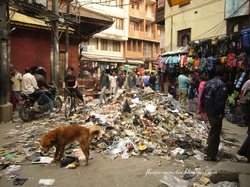
Nepal’s ecosystem faces many challenges as it attempts to accommodate rapid changes of the 21st century. These challenges are brought on largely by climate change and an increasing number of tourists to both urban and rural areas. Pollution is a major problem in urban centers as they struggle to accommodate both tourists and the increasing movement of Nepali’s from rural areas into the cities. The cities lack infrastructure for removal of garbage causes major issues, as you can see trash piled up on street corners and roadside banks surrounding the city. Rural areas also struggle to adapt as tourists flood the villages scattered throughout the Himalayan Mountains. These ancient villages have been forced to change rapidly since 1969 when the Nepali government opened its doors to independent travelers. The tourist industry has provided economic stimulation to villages along popular hiking trails, but it has also forced them to adapt in ways that threaten the ecosystem. Firewood for tourists has contributed to deforestation, and an increase demand for foodstuff contributes to soil erosion as farmers are forced to clear more land for crops. Prior to the tourist boom, these ancient villages existed for generations with relatively unchanging variables of supply and demand. As a result, the local farmers lack knowledge of sustainable agriculture when it comes to producing crops for a significantly larger amount of people. The Nepali government has recently begun to recognize the burdens tourism places on its ecosystem and has placed regulations on tourism in its most vulnerable areas. Though a step in the right direction, this regulation can only slow the degradation of its ecosystem. Tourists can make a major impact on the rate of degradation by acting in ways that minimize burdens placed on the environment. My blog will show tourists the many ways they can help preserve the wonderful and fragile ecosystem of Nepal.
